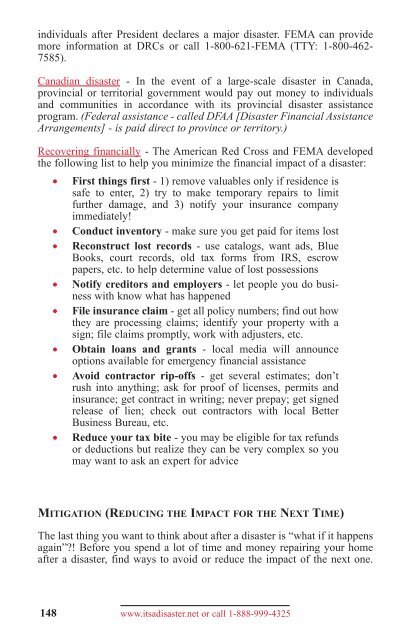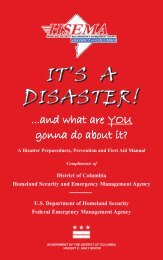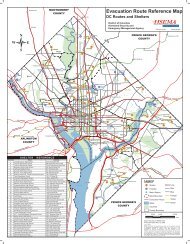disaster 5th 1108_5th ed 2011 - Homeland Security and Emergency ...
disaster 5th 1108_5th ed 2011 - Homeland Security and Emergency ...
disaster 5th 1108_5th ed 2011 - Homeland Security and Emergency ...
You also want an ePaper? Increase the reach of your titles
YUMPU automatically turns print PDFs into web optimized ePapers that Google loves.
individuals after President declares a major <strong>disaster</strong>. FEMA can provide<br />
more information at DRCs or call 1-800-621-FEMA (TTY: 1-800-462-<br />
7585).<br />
Canadian <strong>disaster</strong> - In the event of a large-scale <strong>disaster</strong> in Canada,<br />
provincial or territorial government would pay out money to individuals<br />
<strong>and</strong> communities in accordance with its provincial <strong>disaster</strong> assistance<br />
program. (F<strong>ed</strong>eral assistance - call<strong>ed</strong> DFAA [Disaster Financial Assistance<br />
Arrangements] - is paid direct to province or territory.)<br />
Recovering financially - The American R<strong>ed</strong> Cross <strong>and</strong> FEMA develop<strong>ed</strong><br />
the following list to help you minimize the financial impact of a <strong>disaster</strong>:<br />
• First things first - 1) remove valuables only if residence is<br />
safe to enter, 2) try to make temporary repairs to limit<br />
further damage, <strong>and</strong> 3) notify your insurance company<br />
imm<strong>ed</strong>iately!<br />
• Conduct inventory - make sure you get paid for items lost<br />
• Reconstruct lost records - use catalogs, want ads, Blue<br />
Books, court records, old tax forms from IRS, escrow<br />
papers, etc. to help determine value of lost possessions<br />
• Notify cr<strong>ed</strong>itors <strong>and</strong> employers - let people you do business<br />
with know what has happen<strong>ed</strong><br />
• File insurance claim - get all policy numbers; find out how<br />
they are processing claims; identify your property with a<br />
sign; file claims promptly, work with adjusters, etc.<br />
• Obtain loans <strong>and</strong> grants - local m<strong>ed</strong>ia will announce<br />
options available for emergency financial assistance<br />
• Avoid contractor rip-offs - get several estimates; don’t<br />
rush into anything; ask for proof of licenses, permits <strong>and</strong><br />
insurance; get contract in writing; never prepay; get sign<strong>ed</strong><br />
release of lien; check out contractors with local Better<br />
Business Bureau, etc.<br />
• R<strong>ed</strong>uce your tax bite - you may be eligible for tax refunds<br />
or d<strong>ed</strong>uctions but realize they can be very complex so you<br />
may want to ask an expert for advice<br />
MITIGATION (REDUCING THE IMPACT FOR THE NEXT TIME)<br />
The last thing you want to think about after a <strong>disaster</strong> is “what if it happens<br />
again”! Before you spend a lot of time <strong>and</strong> money repairing your home<br />
after a <strong>disaster</strong>, find ways to avoid or r<strong>ed</strong>uce the impact of the next one.<br />
148 www.itsa<strong>disaster</strong>.net or call 1-888-999-4325





